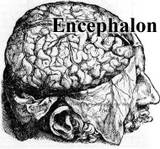Neuroscience

Welcome to the Fourth Edition of Encephalon, a neuroscience blog carnival.
 Let's talk about psychedelics (or serotonergic agonists of the 2A/C receptor subtype).
Let's talk about psychedelics (or serotonergic agonists of the 2A/C receptor subtype).
Jonathan at The Neurophile has submitted an essay on the terminology used for certain classes of psychoactive drugs. Namely, psychedelics. Or hallucinogens. Or...? A most interesting discussion ensues.
 Let's talk about testosterone!
Let's talk about testosterone!
Shelley presents Sex Hormones! The Chemistry Behind Testosterone Doping, posted at Retrospectacle: A Neuroscience Blog. It describes how the sex hormone testosterone is used in sports doping, and provides a breakdown of the tests used to detect it.
Steve from Omni Brain begins Seeing with Sound with the story of a blind, skinny 14-year-old kid who is able to "see" with sound. He goes on to discuss a talk by Beata Jarosiewicz on Neural Prosthetics:
Don't Try This At Home: Working Memory and Convulsions
Don't Try This At Home Either: Perceptual Enhancement Among the Deaf
The Mousetrap also takes on critics of the view that depression is a disease, a topic that has generated many heated comments in a certain blog.

 Sandra from Neurofuture discusses the neuromethods and neuroethics of lie detection in "Brain fingerprinting" smudged. This is a timely topic once again, because No Lie MRI, Inc. is back in the news.
Sandra from Neurofuture discusses the neuromethods and neuroethics of lie detection in "Brain fingerprinting" smudged. This is a timely topic once again, because No Lie MRI, Inc. is back in the news.
From the company's minimalistic web site:
The Neurocritic has weighed in on the overblown nature of these claims, with Brain Scans and Lie Detection: True or False?, Would I Lie to You?, and More Lies... Damn Lies...
Finally, Neurofuture presents a piece on Neuromarketing then and now. Then, as now, mirror neurons are the answer to everything. Or maybe the Halle Berry neuron is the answer to everything...
ADDENDUM!
The next edition of Encephalon will be at Developing Intelligence in two weeks.
- Encephalon 30: The Retirement Party
This is edition number 30 of the brain science blog carnival Encephalon, and it's also my final Neurofuture post. Let's go! Eric Michael Johnson presents Brains on Purpose illustrates a good example of inaccuracy and extrapolation in Anatomy...
- Cognitive Enhancement And Neurotech
Chris Chatham at Developing Intelligence posed a few thoughtful questions today on cognitive enhancement. Are "cognitive enhancement" technologies overhyped? If there is real potential for cognitive enhancement, what are the implications? Would you use...
- Of Two Minds On Brains, Pains, And Psychiatry
The 40th edition of Encephalon1 is available for your viewing pleasure at Mind Hacks. Read about a homolog of Broca's area in the chimpanzee brain (see original article by Taglialatela et al., 2008)! And more! In other news, the most anticipated...
- Encephalon 30
...
- The Synapse, Spooky Issue 10
Step right up to the Carnival of Souls, aka The Synapse. View trailer for Carnival of Souls. Read more about fear, disgust, and Carnival of Souls at The Neurocritic. Now let's get started on The Synapse's Treehouse of Horror! See mechanical brains...
Neuroscience
Encephalon - 4th Edition

Welcome to the Fourth Edition of Encephalon, a neuroscience blog carnival.
 Let's talk about psychedelics (or serotonergic agonists of the 2A/C receptor subtype).
Let's talk about psychedelics (or serotonergic agonists of the 2A/C receptor subtype).Jonathan at The Neurophile has submitted an essay on the terminology used for certain classes of psychoactive drugs. Namely, psychedelics. Or hallucinogens. Or...? A most interesting discussion ensues.
 Let's talk about testosterone!
Let's talk about testosterone!Shelley presents Sex Hormones! The Chemistry Behind Testosterone Doping, posted at Retrospectacle: A Neuroscience Blog. It describes how the sex hormone testosterone is used in sports doping, and provides a breakdown of the tests used to detect it.
Steve from Omni Brain begins Seeing with Sound with the story of a blind, skinny 14-year-old kid who is able to "see" with sound. He goes on to discuss a talk by Beata Jarosiewicz on Neural Prosthetics:
The vOICe system (haha.. get it... "ohh I see!"..ohh geez) creates complex sounds based on what the video system sees.Chris from Developing Intelligence writes about two things you shouldn't try at home:
Don't Try This At Home: Working Memory and Convulsions
Don't Try This At Home Either: Perceptual Enhancement Among the Deaf
If febrile convulsions can confer benefits to learning and memory, then might other neurological disorders offer similar cognitive enhancement? As it turns out, an article in the newest issue of the Journal of Cognitive Neuroscience speaks to this very question, and turns up some fascinating results.The neurophilosopher writes about what we might learn about human brain evolution from the neanderthal genome project:
A comparison of the genomes of neanderthals and humans will not, of course, highlight any anatomical or functional differences between the human and neanderthal brain. It will, though, hopefully shed more light on the molecular events underlying evolution of the human brain, which in turn may allow researchers to infer more about the differences in the brains of the two species.Love is a journey and mind is a brittle object (according to George Lakoff), and Sandy G from The Mousetrap discusses Conceptual Metaphor theory.
The Mousetrap also takes on critics of the view that depression is a disease, a topic that has generated many heated comments in a certain blog.

illustration by Rick Nobles
 Sandra from Neurofuture discusses the neuromethods and neuroethics of lie detection in "Brain fingerprinting" smudged. This is a timely topic once again, because No Lie MRI, Inc. is back in the news.
Sandra from Neurofuture discusses the neuromethods and neuroethics of lie detection in "Brain fingerprinting" smudged. This is a timely topic once again, because No Lie MRI, Inc. is back in the news.From the company's minimalistic web site:
Legal battles often revolve around unsubstantiated claims that cannot be proven by hard evidence. In legal cases, No Lie MRI's evidence will allow objective, scientific, mental evidence, similar to the role in which DNA biological identification evidence is used.Really?? Just like DNA? And this:
Investors discount future cash flows, resulting in lower perceived net present values of possible investments due to the potential of deception from unverifiable claims made by corporate officers of potential investment. These corporate officers could receive higher valuation of the potential investment by lowering the risk to the potential investors. No Lie MRI, Inc. increases value from reducing risk through mental verification.Huh??
The Neurocritic has weighed in on the overblown nature of these claims, with Brain Scans and Lie Detection: True or False?, Would I Lie to You?, and More Lies... Damn Lies...
Finally, Neurofuture presents a piece on Neuromarketing then and now. Then, as now, mirror neurons are the answer to everything. Or maybe the Halle Berry neuron is the answer to everything...
ADDENDUM!
The next edition of Encephalon will be at Developing Intelligence in two weeks.
- Encephalon 30: The Retirement Party
This is edition number 30 of the brain science blog carnival Encephalon, and it's also my final Neurofuture post. Let's go! Eric Michael Johnson presents Brains on Purpose illustrates a good example of inaccuracy and extrapolation in Anatomy...
- Cognitive Enhancement And Neurotech
Chris Chatham at Developing Intelligence posed a few thoughtful questions today on cognitive enhancement. Are "cognitive enhancement" technologies overhyped? If there is real potential for cognitive enhancement, what are the implications? Would you use...
- Of Two Minds On Brains, Pains, And Psychiatry
The 40th edition of Encephalon1 is available for your viewing pleasure at Mind Hacks. Read about a homolog of Broca's area in the chimpanzee brain (see original article by Taglialatela et al., 2008)! And more! In other news, the most anticipated...
- Encephalon 30
...
- The Synapse, Spooky Issue 10
Step right up to the Carnival of Souls, aka The Synapse. View trailer for Carnival of Souls. Read more about fear, disgust, and Carnival of Souls at The Neurocritic. Now let's get started on The Synapse's Treehouse of Horror! See mechanical brains...
